
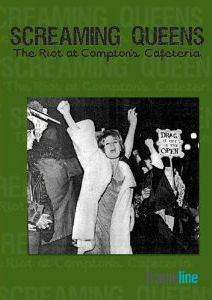

Screaming Queens and Mr. Angel -- Power Point Slides (as a .ppsx Power Point file)
(as a .pdf file - downloads faster)
Gender Characteristics (as a .pdf file)
Transgendered Presence before the Stonewall Riots, 1969
The following documentary gives a glimpse into trans culture just before 1969, back when a transgendered person could be arrested for just walking down the street. It shows the reality depicted fictionally in Stonewall. It also features Flawless Sabrina in her prime. Now Mother Flawless Sabrina, she is still active, interesting, and increasingly honoured.

The Queen (1968)
66 Minute Documentary. It was only released on VHS, now out of print, and is very hard to find. However, you can watch the
entire movie here on YouTube. The quality is mediocre, but watchable. It is obviously an upload from a digital rip of a VHS copy.
Roger Ebert's original 1969 review: Click here for his review.
Mother Flawless Sabrina was recently interviewed by James St. James (one of the New York City Club Kids of the 1990's and subject of the movie Party Monster).
Click here for the interview on the World of Wonder website.
Print interview of Mother Flawless Sabrina on the Whitney Museum of American Art website.
Profile of Mother Flawless Sabrina on the Dazed website.
Trevor (1994)
14 minute short, winner of a 1994 Academy Award, introduced by Ellen

Click here to see Trevor on Ellen's web site.
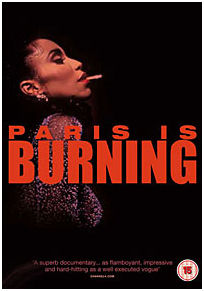
Paris is Burning (1990)
Description from The Advocate magazine's
The Top 175 Essential Films of All Time for LGBT Viewers:
Paris Is Burning (1990): This documentary shone a bright light on the African-American, Latino, and LGBT communities involved in the New York City ball culture of the mid-to-late 1980s. Directed by Jennie Livingston, Paris Is Burning brought an underground aspect of LGBT culture to the mainstream. From the use of slang ("serving realness") to unforgettable quotes ("reading is fundamental"), the film has had a lasting impact on both LGBT and mainstream pop culture. - Jase Peeples
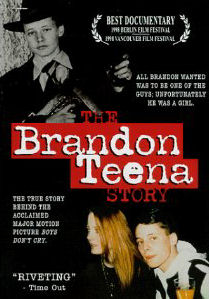
The Brandon Teena Story (1998)
Excellent documentary about the murder of transgender man Brandon Teena in Nebraska on December 31, 1993. His personality will fascinate you. His story and murder, with interesting parallels to the murder of Matthew Shepard soon after this documentary was released, became a defining moment in the awareness of anti-trans violence. The fiction movie immediately below, Boys Don't Cry covers the same story. Watch them both if you can.
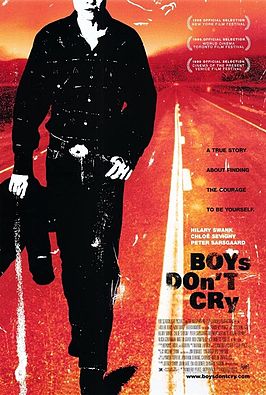
Boys Don't Cry (1999)
Description from The Advocate magazine's
The Top 175 Essential Films of All Time for LGBT Viewers:
Boys Don't Cry (1999): It's easy to dismiss this as an "important" film, but Boys Don't Cry, based on the true story of the murder of Brandon Teena, a young trans man killed in Nebraska, is actually an incredibly good one as well. For a film that ends in such an atrocity, it has a breezy romanticism as we meet the flirty Brandon (played by Hilary Swank, in a role that won her an Oscar and made her career) and weary Lana, the girl he falls in love with. Brandon knows little of other trans people, of hormones or gender identity or even the kind of (sadly still limited, but at least talked about) rights trans people have today. But he's young and in love and troubled, because of having no social safety net, living in an impoverished community, and hiding his birth-gender assignment (and in the film, the lack of medical hormones is the linchpin that eventually leads to his death). Watch it with a big box of Kleenex and a sense of injustice.0
One of the great LGBTQ movies of all time, but be forewarned that the end contains some of the hardest scenes to watch in movie history. If you don't want to go through that, at least try the documentary immediately above.
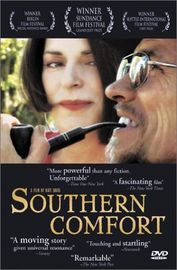
Southern Comfort (2001)
Description from The Advocate magazine's
The Top 175 Essential Films of All Time for LGBT Viewers:
Southern Comfort (2001): One of the saddest trans documentaries is also one of the best as it follows the last year of Robert Eads's life, the complications that transition brings for FTMs and the ways in which all LGBT have made family. A transgender man, Eads was battling ovarian cancer and was turned down by almost two dozen doctors who were afraid that treating a trans man with cancer would harm their reputations. By the time a doctor would care for him, the cancer was too advanced for his life to be saved. Still, we see the man and his partner, trans woman Lola, and their chosen family fight fear, discrimination, and stigma to be who they are and live with dignity. Eads's last appearance was at the famed trans gathering Southern Comfort, as he died shortly after. -D.A.M.
Note:
Be careful not to confuse this movie with a macho action flick made in 1981 with the same name.
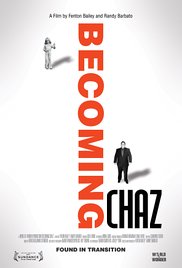
Becoming Chaz (2011)
Produced in association with the Oprah Winfrey Network, Becoming Chaz follows his transition from Chastity to Chaz, along with the reactions of friends and family. OWN is working on a follow-up, Being Chaz.
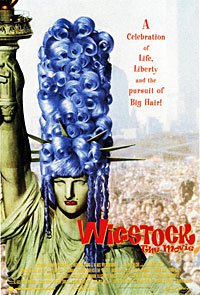
Wigstock (1995)
Description from The Advocate magazine's
The Top 175 Essential Films of All Time for LGBT Viewers:
Wigstock (1995): RuPaul, Alexis Arquette, Joey Arias, and Lypsinka are among the headline acts in Wigstock, a 1995 documentary that captured the extravaganza of the annual drag festival. Although no longer active, Wigstock, which traditionally took place in the East Village on Labor Day, functioned as a mainstay of the gay New York social calendar since the 1980s, and the documentary lovingly captures the campy glamour of the performances as well as under-the-wig glances into the performers backstage. Wigstock also features an appearance by Lady Bunny, one of the festival's founders and the mistress of ceremonies, who attempts to have the Statue of Liberty bewigged.
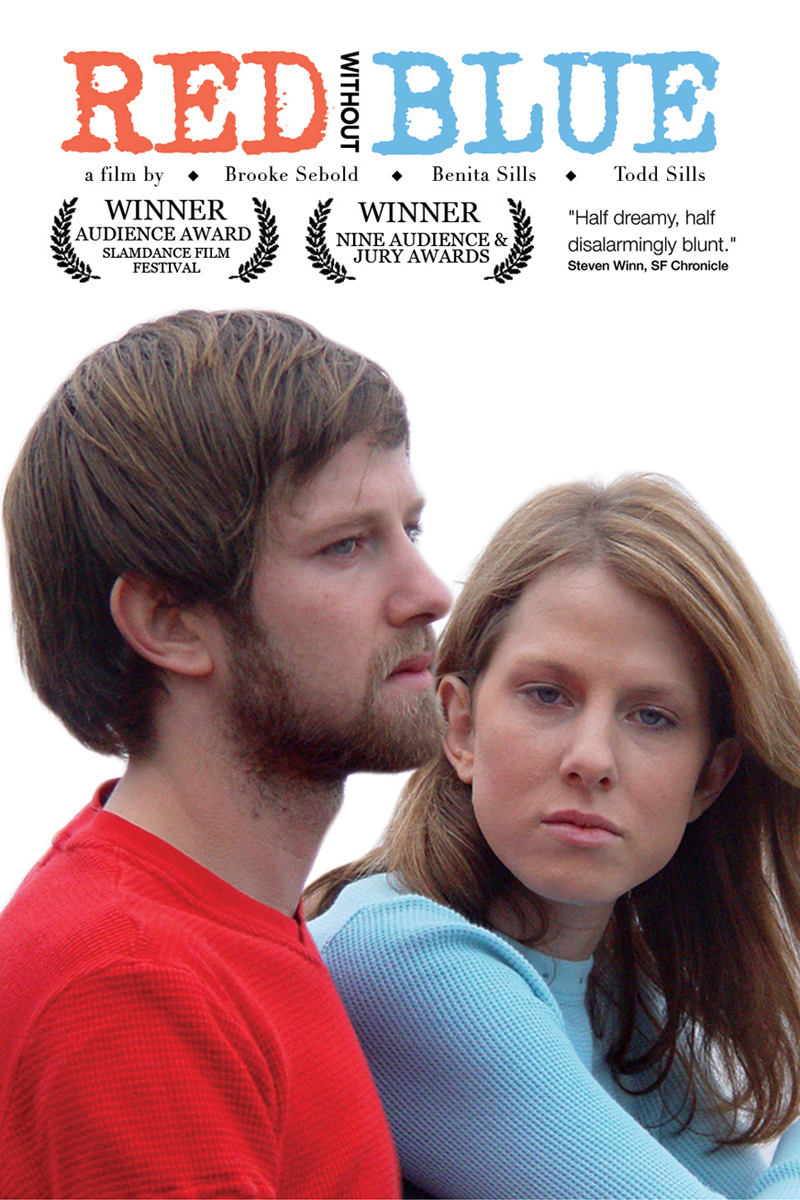
Red Without Blue (2007)
Description from The Advocate magazine's
The Top 175 Essential Films of All Time for LGBT Viewers:
Red Without Blue (2007): Directed by Benita Sills and Brooke Sebold, Red Without Blue tells the true story of Mark and Alex Farley, twins who grew up in a conservative area of Montana. The film, which won the Audience Award for Best Documentary at the 2007 Slamdance Film Festival, recounts the childhood of the siblings as they navigated coming out, family, bullying, and pedophilia. It also trains a lens on their present-day search for identity, as Mark embarks on his first serious relationship with another man and Alex, who has adopted the name Claire, considers gender-reassignment surgery. By weaving together past and present, Red Without Blue creates a rich and complex portrait of an American family. -D.R.
People, Protest, and Progress: Recent Documentaries About LGBT Lives and History
Osher Lifelong Learning
Institute
University of Illinois, Urbana-Champaign
Casey Sutherland, Study Group Facilitator
Scott Badman,
Study Group Facilitator